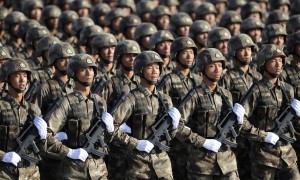
China is building the most extensive global commercial-military empire in history
In the 18th and 19th centuries, the sun famously never set on the British empire. A commanding navy enforced its will, yet all would have been lost if it were not for ports, roads, and railroads. The infrastructure that the British built everywhere they went embedded and enabled their power like bones and veins in a body.
Great nations have done this since Rome paved 55,000 miles (89,000 km) of roads and aqueducts in Europe. In the 19th and 20th centuries, Russia and the United States established their own imprint, skewering and taming nearby territories with projects like the Trans-Siberian and the Trans-Continental railways.
Now it’s the turn of the Chinese. Much has been made of Beijing’s “resource grab” in Africa and elsewhere, its construction of militarized artificial islands in the South China Sea and, most recently, its new strategy to project naval power broadly in the open seas.
Yet these profiles of an allegedly grasping and treacherous China tend to consider its ambitions in disconnected pieces. What these pieces add up to is a whole latticework of infrastructure materializing around the world. Combined with the ambitious activities of Chinese companies, they are quickly growing into history’s most extensive global commercial empire.
China views almost no place as uncontested. Chinese-financed and -built dams, roads, railroads, natural gas pipelines, ports, and airports are either in place or will be from Samoa to Rio de Janeiro, St. Petersburg to Jakarta, Mombasa to Vanuatu, and from the Arctic to Antarctica. Many are built in service of current and prospective mines, oilfields, and other businesses back to China, and at times to markets abroad.
But while this grand picture suggests a deliberate plan devised in Beijing, it also reflects an unbridled commercial frenzy. Chinese companies are venturing out and doing deals lacking any particular order. Mostly, they’re interested in finding growth abroad that is proving difficult to manage at home. This, too, is typical for a fast-growing power.
“This is very much in line with what we would expect from other great powers whose military posture follows its economic and diplomatic footprint,” Lyle Morris, a China specialist with Rand, told Quartz.
READ THE FULL ARTICLE HERE.





Leave a Reply